Hey there, fellow dog parent! I’m Dr. Candy Akers, a holistic veterinarian and fellow dog lover. I’m here to share my knowledge about a topic that’s close to my heart – the eye health of our beloved Boerboel dogs. As a vet, I’ve seen a multitude of breeds, but Boerboels hold a special place in my heart. However, like all breeds, they have their unique health concerns. Today, we’ll be focusing on Boerboel Eye Health.
Boerboels, with their soulful eyes and gentle nature, are a joy to have in our lives. However, these dogs can be prone to certain eye conditions that can affect their quality of life. Understanding the specific eye structure of Boerboels, the common eye issues they face, and how to prevent and treat these problems is crucial in ensuring your Boerboel lives a long, happy, and healthy life.
I’ll be sharing some practical tips on maintaining your Boerboel’s eye health, from diet considerations to environmental hygiene. We’ll also discuss routine care and maintenance that can help prevent common Boerboel Eye Problems. So, sit back, grab a cup of tea, and let’s talk about how we can take the best care of our Boerboel’s eyes. Remember, a little knowledge can go a long way in keeping our furry friends healthy!
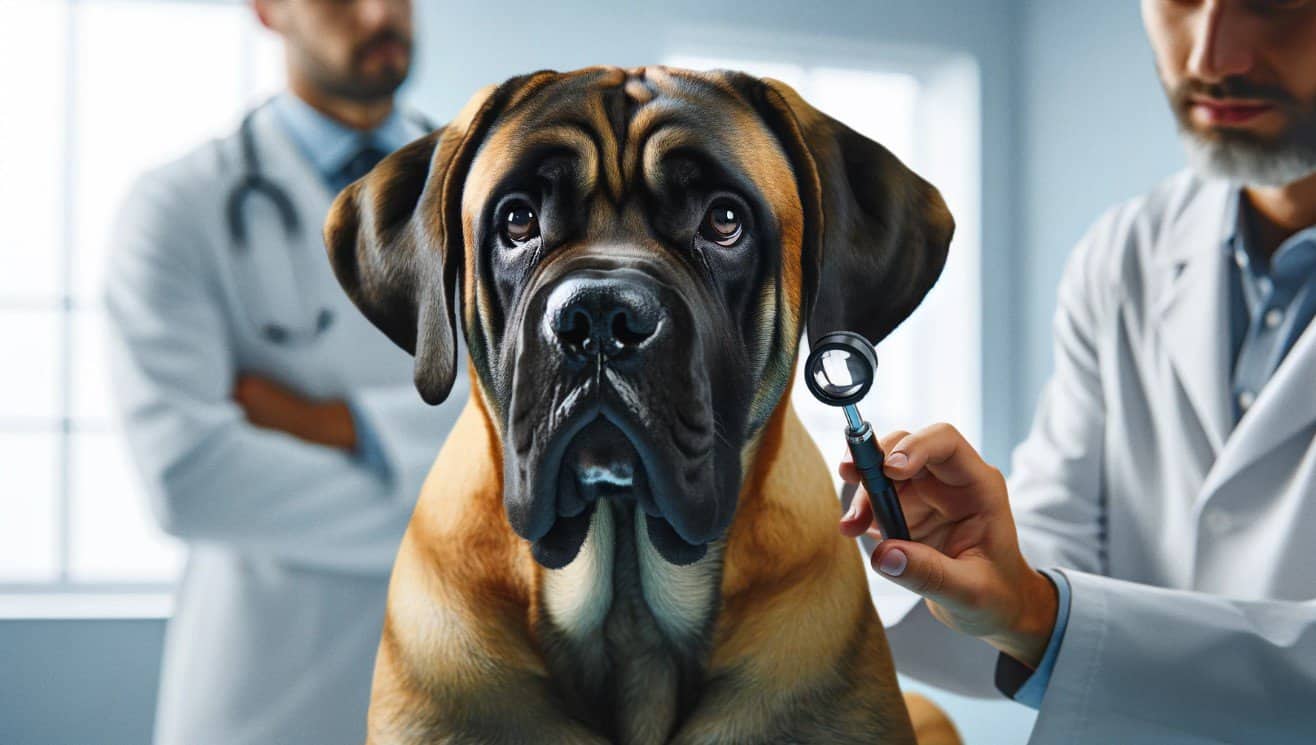
Understanding Breed Specific Eye Structure
As a holistic veterinarian and a dog parent myself, I understand the importance of knowing your pet’s unique physical attributes. When it comes to Boerboels, understanding their specific eye structure can be crucial for maintaining their eye health. So, let’s delve into what makes the eyes of this breed so distinctive.
Boerboels, a robust and muscular breed originating from South Africa, have a captivating gaze thanks to their medium-sized, horizontally set eyes. Their eye color usually ranges from shades of brown to nearly black, often matching their coat color. The shape of their eyes is more oval than round, giving them a unique and intense expression.
The eyes of this breed are set well apart, which is a significant factor in their wide field of vision. This trait, combined with their deep-set eyes, provides them with excellent peripheral vision, a feature that was crucial for their original purpose as farm dogs in South Africa.
However, this breed-specific eye structure also comes with its own set of challenges. The deep-set eyes of Boerboels make them more prone to certain eye conditions such as Entropion, where the eyelid rolls inward causing the eyelashes to rub against the eye. This can lead to discomfort, tearing, and even corneal ulcers if not treated promptly.
Similarly, their wide field of vision, while a benefit in their working environment, can make them more susceptible to environmental irritants such as dust, pollen, or harsh chemicals from cleaning products. These irritants can cause discomfort and inflammation, potentially leading to conditions like Conjunctivitis.
Understanding the Boerboel’s eye structure is the first step towards maintaining their eye health. It helps us as dog parents to be aware of the potential eye problems they may face and take proactive measures to prevent or manage them effectively. Remember, our furry friends rely on us for their wellbeing, and nothing beats the reward of seeing them healthy and happy.
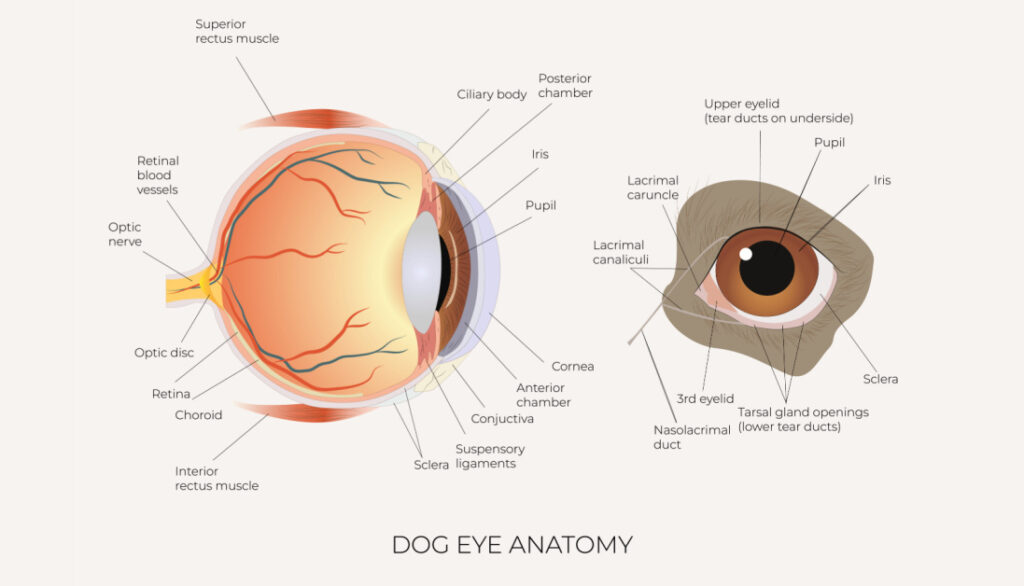
Common Eye Issues In Boerboel
As a veterinarian, I often hear concerns from Boerboel owners regarding their pet’s eye health. Boerboels, like many large breeds, are prone to certain eye conditions. It’s essential for owners to recognize the signs early to ensure their Boerboel’s eye health remains optimal.
One common issue is Entropion, a condition where the eyelid rolls inward. This can cause the eyelashes to rub against the cornea, leading to irritation, redness, and discomfort. If left untreated, it can lead to more serious complications like corneal ulcers or even blindness.
Another condition to watch out for is Ectropion. In this condition, the eyelid rolls outward, exposing the inner eyelid. This exposure can lead to dryness, irritation, and infection. Again, early detection is critical for effective treatment.
Cherry Eye, or prolapse of the third eyelid, is also seen in Boerboels. This condition may appear as a red, swollen mass in the corner of the eye. It’s not typically painful, but it can cause tear production issues and should be addressed promptly.
Lastly, Progressive Retinal Atrophy (PRA) is a genetic condition that some Boerboels may inherit. PRA gradually deteriorates the retina, leading to eventual blindness. Symptoms include difficulty seeing at night or in low light and dilated pupils. Unfortunately, there’s no cure for PRA, but knowing your dog’s genetic status can help you prepare and manage the condition.
- Entropion – Eyelid rolls inward
- Ectropion – Eyelid rolls outward
- Cherry Eye – Prolapse of the third eyelid
- Progressive Retinal Atrophy (PRA) – Gradual deterioration of the retina
Remember, maintaining your Boerboel’s eye health involves regular check-ups and prompt attention to any changes in their eyes. If your Boerboel shows signs of eye discomfort, such as squinting, excessive tearing, redness, or changes in eye appearance, don’t hesitate to seek veterinary care. Early detection and treatment can help preserve your beloved pet’s vision and quality of life.
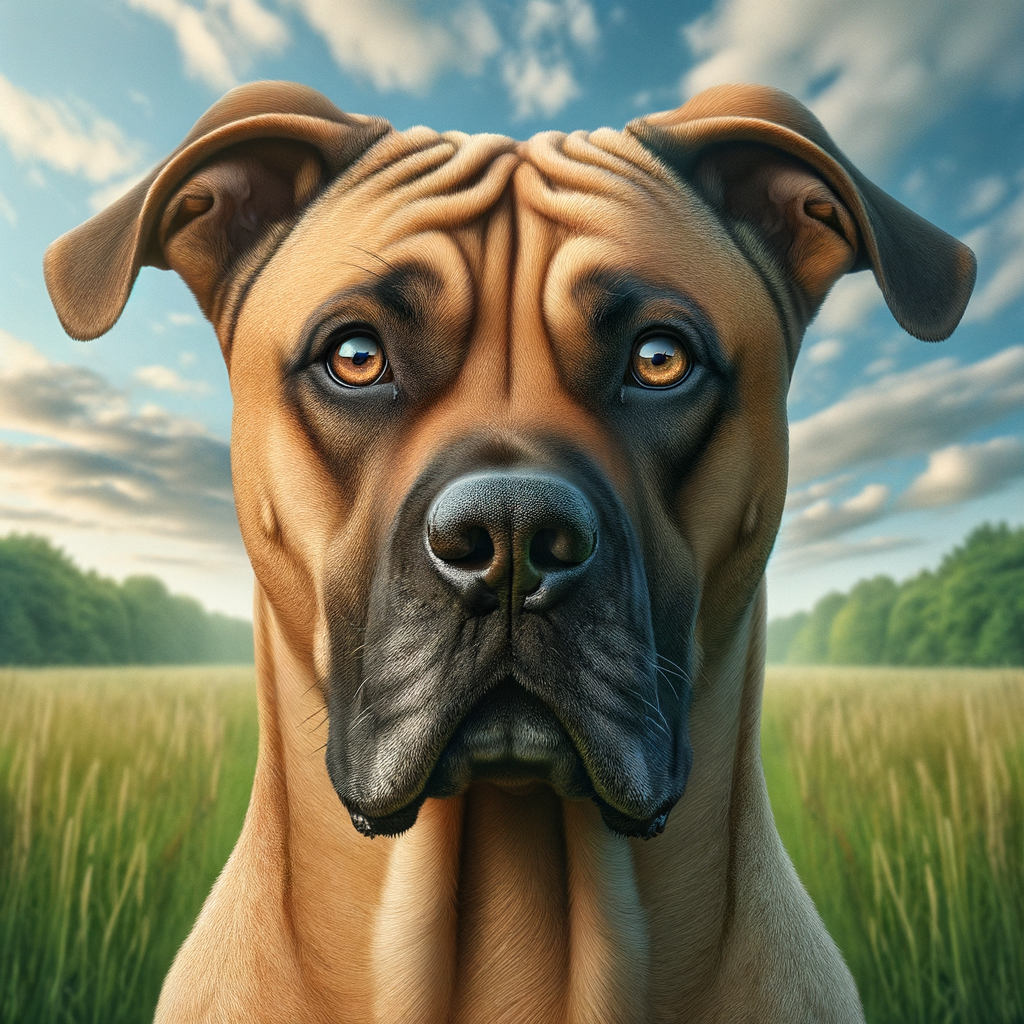
Prevention of Eye Problems
Ensuring your Boerboel gets the right nutrients for optimal eye health is essential for maintaining clear vision and preventing age-related issues. Natural, nutrient-rich foods and supplements can play a key role in supporting their eyesight. From vitamin A-packed freeze-dried liver treats to antioxidant-rich blueberries and targeted supplements like Eyeplex by Standard Process, there are several ways to nourish your dog’s eyes. In this section, we’ll explore how these powerful ingredients contribute to long-term vision health and overall well-being.
Eyeplex by Standard Process
Eyeplex by Standard Process is a specialized supplement designed to support your Boerboel’s eye health with a blend of essential nutrients. Formulated with key vitamins, minerals, and antioxidants, Eyeplex helps protect against oxidative stress, supports retinal function, and promotes overall vision health. Ingredients like vitamin A, vitamin C, and zinc contribute to maintaining strong eyesight, while whole food ingredients provide additional phytonutrients for cellular protection. Adding Eyeplex to your Boerboel’s diet can be especially beneficial for aging dogs or breeds prone to eye conditions, offering targeted nutritional support to keep their vision sharp and healthy for years to come.
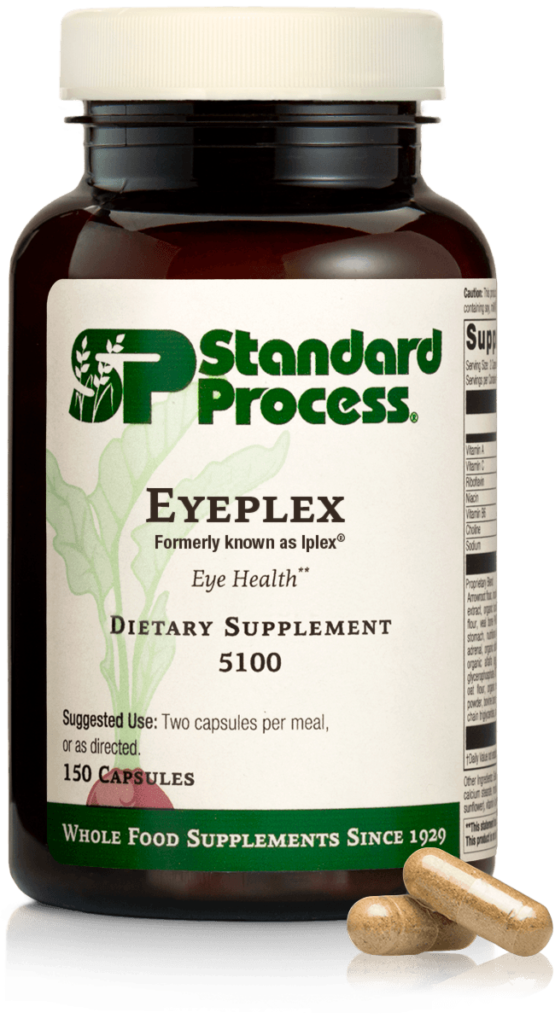
Freeze-Dried Blueberries
Freeze-dried blueberries are a powerhouse of antioxidants that can help protect your Boerboel’s eyes from oxidative stress and age-related damage. Rich in vitamins C and E, as well as anthocyanins, these tiny but mighty berries help combat free radicals that can contribute to eye diseases like cataracts and macular degeneration. Incorporating freeze-dried blueberries into your dog’s diet provides a natural and delicious way to support retinal health, reduce inflammation, and promote overall vision longevity. Plus, they’re a low-calorie, dog-friendly treat that makes a great addition to a balanced diet for long-term eye health.
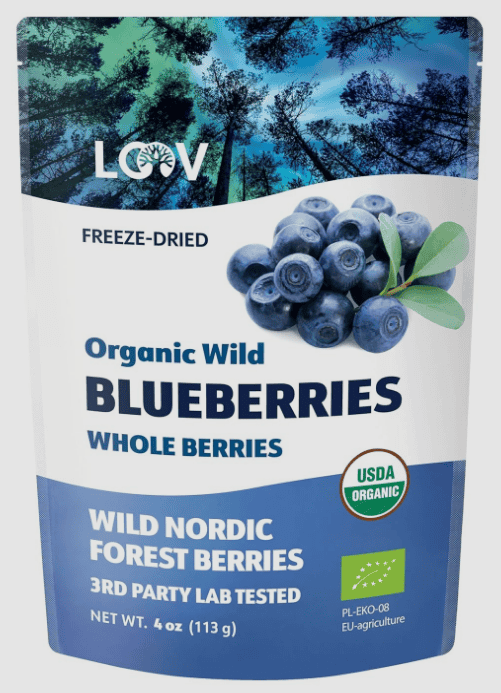
Freeze-Dried Liver
Freeze-dried liver treats are an excellent natural source of vitamin A, an essential nutrient for your Boerboel’s eye health. Vitamin A plays a crucial role in maintaining good vision, especially in low-light conditions, while also supporting overall immune function and skin health. Since liver is rich in bioavailable vitamin A, incorporating freeze-dried liver treats into your dog’s diet provides a convenient and nutritious way to promote optimal eye function. Just be sure to feed them in moderation, as excessive vitamin A can lead to toxicity. Adding these nutrient-packed treats to your pup’s routine is a simple, tasty way to support their long-term vision and well-being!
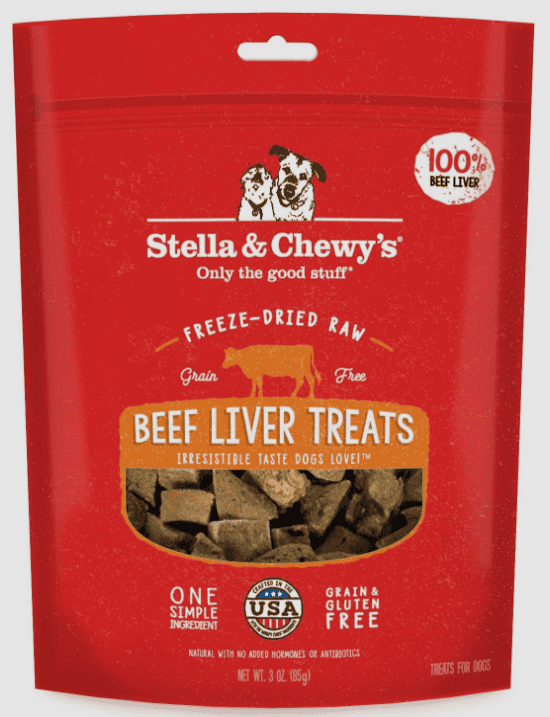
By prioritizing your Boerboel’s eye health through a balanced diet and nutritional supplements, you can help prevent many common eye issues. These simple steps can go a long way in ensuring your pup’s eyes stay healthy and clear for years to come.
As a loving Boerboel parent, you must also consider the environment in which your dog lives, as it can significantly impact their eye health. The environment includes everything your dog interacts with, from the air they breathe to the objects they come into contact with. Here, we’ll discuss how you can maintain environmental hygiene to reduce eye problems in your Boerboel.
Indoor Air Quality
Indoor air quality is paramount when it comes to your Boerboel’s eye health. Poor air quality can lead to eye irritation, discharge, and even more severe eye conditions. Here are a few steps you can take to ensure the air quality in your home is up to par:
- Keep your home well-ventilated: Regularly open windows to let in fresh air, especially in rooms where your Boerboel spends most of their time.
- Use air purifiers: These devices can help remove allergens and pollutants from the air that may irritate your Boerboel’s eyes.
- Avoid smoking indoors: Tobacco smoke can be very harmful to your dog’s eyes, leading to irritation and other eye problems.
Sprays, Diffusers, Candles, Incense
While these items might make your home smell good, they can be harmful to your Boerboel’s eyes. Chemicals in these products can cause eye irritation and even lead to long-term damage. Here’s how you can reduce their impact:
- Choose natural products: Opt for sprays, diffusers, candles, and incense made from natural ingredients. They’re less likely to irritate your dog’s eyes.
- Use these products sparingly: Even natural products can cause irritation if used excessively. Use them sparingly and always in a well-ventilated area.
- Keep these products out of your dog’s reach: Ensure your Boerboel can’t directly interact with these products to prevent accidental ingestion or direct eye contact.
By maintaining a clean and healthy environment, you can significantly reduce the risk of your Boerboel developing eye problems. Remember, your pet’s health is a reflection of the care and love you provide, and that includes the environment they live in. Keep it clean, safe, and comfortable for your Boerboel to ensure their overall wellbeing, including their eye health.
Routine Boerboel Eye Care & Maintenance
As a loving Boerboel parent, you must understand that maintaining your pet’s eye health is a critical part of their overall well-being. With the right care, you can prevent many of the common Boerboel eye problems and ensure your pet’s eyes remain bright and healthy.
Daily & Weekly Care & Maintenance
Start by incorporating a daily routine of checking your Boerboel’s eyes for any signs of redness, discharge, or any other abnormalities. Use a clean, damp cloth to gently wipe away any crust or discharge around the eye area. Always remember to use a separate cloth for each eye to avoid potential cross-contamination.
On a weekly basis, it’s a good idea to provide a more thorough eye examination. Look out for changes in eye color, cloudiness, or if your Boerboel is squinting, blinking excessively, or seems to be in discomfort. If you notice any of these signs, it’s time to consult your vet.
Monitor Hair Length, Nail Length, Bath Frequency
Other factors that can affect Boerboel eye health include hair length, nail length, and bath frequency. Keeping your Boerboel well-groomed can prevent hair from irritating their eyes. Regularly trim their hair, especially around the eyes, and keep their nails short to avoid accidental scratches.
When it comes to bathing, be mindful not to get soap or shampoo in your Boerboel’s eyes, as this can cause irritation. Always use a dog-friendly shampoo and try to avoid the eye area as much as possible. If soap does get into their eyes, rinse thoroughly with clean, lukewarm water.
Remember, regular vet check-ups are essential for catching any potential Boerboel eye diseases early. Your vet can provide a comprehensive eye examination and offer advice tailored to your pet’s needs.
By following these simple steps, you’ll be doing a great job in maintaining your Boerboel’s eye health. Always remember, a little effort goes a long way in ensuring your furry friend’s well-being!
Frequently Asked Questions
1. What are common eye conditions that affect Boerboels?
Boerboels can be prone to various eye conditions such as entropion (inward rolling of the eyelids), ectropion (outward rolling of the eyelids), cherry eye (prolapse of the third eyelid gland), cataracts, and progressive retinal atrophy (PRA).
2. How can I identify if my Boerboel has an eye problem?
Watch out for symptoms like excessive tearing, redness, swelling, discharge, squinting, cloudiness, bump or growth on the eye, or any changes in vision. If you notice any of these signs, it is recommended to consult a veterinarian for a thorough examination.
3. Can eye conditions in Boerboels be treated?
Yes, many eye conditions in Boerboels can be treated. The treatment options depend on the specific condition and its severity. Some conditions may require medications, eye drops, or ointments, while others may need surgical intervention.
4. How can I prevent eye problems in my Boerboel?
To help prevent eye problems in your Boerboel, it is essential to maintain good overall health. Regular veterinary check-ups are crucial for early detection of any eye issues. Additionally, keeping the eyes clean, avoiding exposure to irritants, and providing a balanced diet with necessary vitamins and minerals can contribute to better eye health.
5. Should I seek immediate veterinary care if my Boerboel has an eye injury?
Yes, if your Boerboel experiences an eye injury, it is recommended to seek immediate veterinary care. Eye injuries can be serious and may require prompt treatment to prevent further damage or complications.
